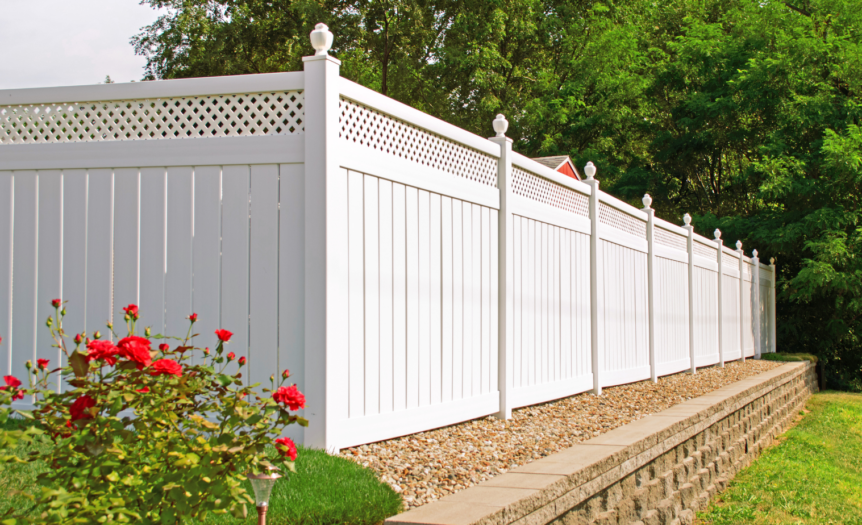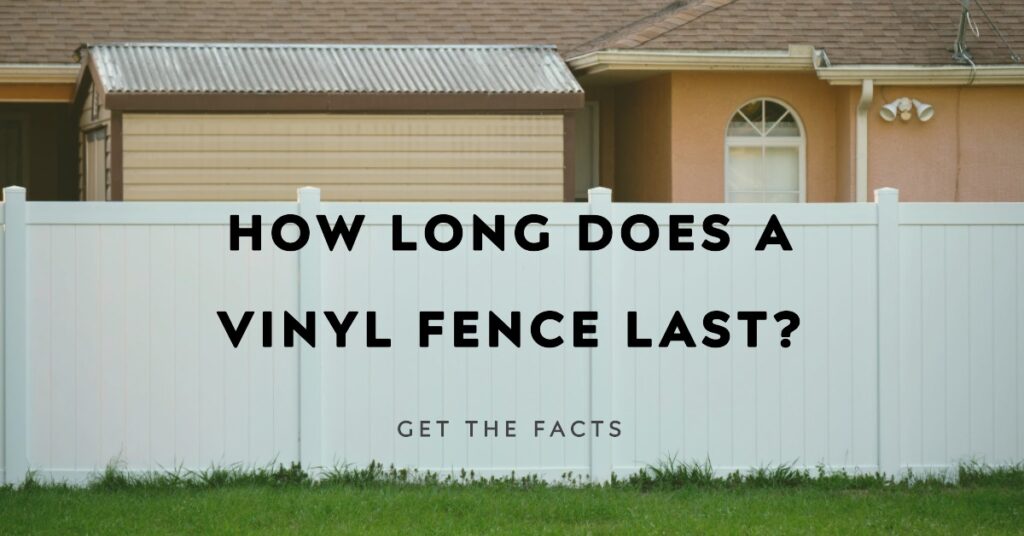When it comes to fencing options for your home and guide on how to do proper fencing, one material that stands out in terms of aesthetics and durability is vinyl. But how long does a vinyl fence last? In this blog post, we’ll delve into the world of vinyl fencing by discussing its characteristics and comparing it with other common fencing materials like wood and chain link.
We’ll also examine factors affecting the lifespan of these fences, including installation techniques, weather conditions, maintenance practices and more.
Understanding Vinyl Fencing
Vinyl fencing is a popular alternative to wood, chain link, and composite fences because of its durability, versatility, and low-maintenance requirements.
What Is Vinyl Fencing?
Vinyl fencing, also known as polyvinyl chloride (PVC) fencing, has become a popular choice among homeowners for its durability and low-maintenance features. Made from a plastic-based material, vinyl fences offer an alternative to traditional wood or metal fencing options.
One notable advantage of vinyl fencing is its resistance to common problems associated with other materials like rotting or rusting due to moisture exposure. For instance, unlike wooden fences that may warp or decay over time without proper care, vinyl maintains its appearance and structural integrity even when subjected to harsh weather conditions.
Comparison With Other Fencing Materials
Vinyl fencing has become a popular choice among homeowners due to its durability and low maintenance. When compared with other fencing materials such as wood or chain link, vinyl fences stand out for their resistance to rotting, fading, and corrosion.
Unlike wood fences that require regular upkeep like staining or painting, vinyl fence owners can simply wipe down their fences occasionally to keep them looking good as new.
While composite fencing is also gaining popularity in the market, it doesn’t quite measure up to the strength and longevity of vinyl fences. While initial costs may be higher for vinyl fencing than traditional wood options upfront, over time, homeowners save money on maintenance expenses and more extended lifespan.
Video Credit (Cascade Fence & Deck)
Factors Affecting The Lifespan Of Vinyl Fences
The quality of the vinyl material, proper installation techniques, and climate/weather conditions are all crucial factors that can greatly impact the lifespan of your vinyl fence.
Quality Of Vinyl Material
The quality of the vinyl material used to make your fence is a significant factor that affects its lifespan. It’s crucial to invest in high-quality vinyl, as cheap vinyl fences may deteriorate or discolor quickly, which could result in unsightly and structurally weak fencing.
Another aspect of quality that you should consider is the warranty offered by the manufacturer. A longer warranty period usually means that a company trusts their product enough to back it with an extended guarantee. The quality of the vinyl for your fence is important so that it will last for a long time one time I bought a cheap vinyl fence and it did not even last 3 years before I had to start replacing and fixing things so make sure you go with quality over price because doing a cheaper fence will cost you more over time.
The quality of the vinyl for your fence is important so that it will last for a long time one time I bought a cheap vinyl fence and it did not even last 3 years before I had to start replacing and fixing things so make sure you go with quality over price because doing a cheaper fence will cost you more over time.– Jacob Michal, CEO Of Louisville Cash Real Estate. Sell My House Fast Louisville KY
Proper Installation Techniques
Proper installation techniques are crucial for maximizing the lifespan of your vinyl fence. This starts with choosing a reputable and experienced contractor who specializes in vinyl fencing installation.
This ensures that they have the necessary tools, knowledge, and experience to install the fence properly. During installation, it is important to ensure that each post is set deep enough into the ground for added stability and support.
Posts should also be spaced evenly apart to prevent sagging or warping over time.
Taking these steps during installation not only helps prolong the life of your vinyl fence but can also minimize repairs down the road.
Keywords: Vinyl fencing durability, Vinyl fence lifespan, Longevity of vinyl fences, Proper Installation Techniques
Climate And Weather Conditions
Climate and weather conditions play a significant role in determining the lifespan of your vinyl fence. Vinyl fencing is known to withstand harsh weather elements, but extreme temperatures and environmental factors can still impact their longevity.
For instance, if you live in an area that experiences high heat or prolonged exposure to sunlight, it can cause your vinyl fence to fade or crack over time.
In areas prone to heavy rainfall or humidity, moisture can be trapped inside the vinyl material causing mold growth and discoloration. Consequently, regular cleaning and maintenance are crucial in such regions to prevent damage caused by natural elements.
Additionally, strong winds and storms may cause branches or debris falling on the fence leading to cracks or breakage.
By considering these climate-related factors when installing a vinyl fence investment in quality materials ,and establishing proper maintenance practices you will elongate the life expectancy of your fence protecting it from significant wear and tear due resulting from natural circumstances beyond control .
Maintenance And Cleaning
To keep your vinyl fence looking great and functioning properly, proper maintenance and cleaning are key. Regularly inspect your fence for damage or wear, such as cracks or breaks in the material, loose posts or rails, or discoloration from exposure to the sun’s UV rays.
For routine cleaning, simply rinse your vinyl fence with a garden hose and scrub away dirt with a soft brush or cloth. Avoid using harsh chemicals or abrasive materials that can scratch or weaken the surface of the vinyl.
By taking good care of your vinyl fence over time, you can extend its lifespan and ensure it looks great for years to come.
How Long Can You Expect Your Vinyl Fence To Last?
Industry estimates and real-life examples suggest that a properly installed and maintained vinyl fence can last anywhere from 20 to 30 years or more, depending on various factors such as the quality of the material and weather conditions.
Industry Estimates
Vinyl fences have become increasingly popular due to their durability and low maintenance requirements. Industry estimates suggest that a well-maintained vinyl fence can last up to 30 years.
Real-life examples from homeowners suggest that they have experienced even longer lifespans for their vinyl fences. Some report that their fences have lasted over 40 years! Others who have neglected maintenance or experienced extreme weather may see a shorter lifespan closer to the industry average.
Real-Life Examples
There are many real-life examples of vinyl fences lasting for years, even decades. For instance, some homeowners who had their vinyl fences installed in the early 1990s have reported that their fencing is still going strong after nearly three decades.
Another factor contributing to the long lifespan of vinyl fencing is its resistance to weather and climate conditions. Homeowners living in harsh weather areas such as coastal regions or places with extreme temperatures can rest easy knowing that their fence will not warp, rot, or fade over time.
Tips For Extending The Life Of Your Vinyl Fence
Regular cleaning and maintenance can go a long way in extending the lifespan of your vinyl fence. Additionally, avoid accidental damage, repair or replace damaged components, upgrade to higher-quality vinyl material, and inspect for issues on a regular basis.
Regular Cleaning And Maintenance
To ensure the longevity of your vinyl fence, regular cleaning and maintenance are crucial. Over time, dirt, dust, and grime can accumulate on the surface of your fence, leading to discoloration and staining.
In addition to cleaning, it’s also essential to inspect your fence regularly for any signs of damage or wear. Look out for cracks or holes in the material, loose posts or rails, and other signs of damage.
If you spot any issues early on, addressing them promptly will help prevent further damage down the line.
Avoiding Damage
To extend the lifespan of your vinyl fence, it’s important to take steps to avoid damage. One common cause of damage is accidental impact from lawnmowers, cars or other equipment.
To prevent this, make sure you install bollards or similar barriers around the fence perimeter or create a physical barricade with plants or bushes.
Another factor that can contribute to vinyl fence damage is weather conditions like strong winds and freezing temperatures. Regularly inspecting your fence for signs of wear and tear will help you detect any problems early on so they can be fixed before causing more extensive harm.
Repairing Or Replacing Damaged Components
In the event of damage to your vinyl fence, it is important to address and repair it promptly. Small damages, such as cracks or breaks in individual panels, can often be repaired by replacing the damaged component.
Most vinyl fences are designed with easily replaceable panels and posts, making repairs relatively simple.
For larger damages or structural issues, professional repair or replacement may be necessary. DIY repairs for major structural problems could result in further damage that may cost significantly more to fix over time.
It’s essential always to consult a professional before attempting any significant repairs on your own – this will ensure proper installation techniques and prevent costly mistakes.
Upgrading To Higher-Quality Vinyl Material
One of the best ways to extend the lifespan of your vinyl fence is by upgrading to higher-quality vinyl material. While all vinyl fences are made from PVC, some manufacturers use better quality materials than others.
Look for fencing that is labeled as “virgin” or “pure” PVC, which means it has not been recycled and contains no impurities.
Additionally, consider investing in thicker vinyl panels and posts with reinforced aluminum or steel inserts for added strength. This can help resist damage from wind, impact, or other stressors that may cause cracks or breaks in your fence.
Conclusion
In conclusion, the lifespan of a vinyl fence depends on various factors, including the quality of material, climate conditions, and maintenance. Generally, industry estimates suggest that vinyl fences can last up to 30 years or more with proper care.
However, real-life examples have shown that some vinyl fences may last even longer than that. To extend the life of your vinyl fence, make sure to keep it clean and free from damage.
Any damaged components should be repaired or replaced immediately to prevent further deterioration. Upgrading to higher-quality vinyl material can also enhance the durability and longevity of your fence.







